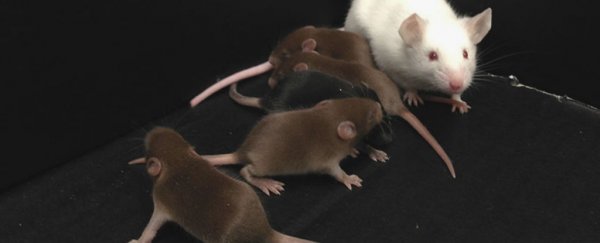For the first time, researchers have managed to breed male mice (testicles and all) with no trace of a Y chromosome. And not only are they healthy, they've been able to reproduce - with a little help.
The finding seems to go against one of the most fundamental principles of biology - if an organism inherits an X chromosome from its father, it's female, and if it inherits a Y chromosome, it's male. The Y chromosome has come to be known as the very symbol of masculinity, but over the past few years, scientists have found evidence that maybe it isn't going to be around forever - over the course of human evolution, it's has been shrinking at an alarming rate.
"The X bears about 1,600 genes with varied functions. But the Y has hardly any genes; maybe 50, and only 27 of these are in the male-specific part of the Y," geneticist Jenny Graves from La Trobe University in Australia writes at The Conversation.
"Many are present in multiple copies, most of them inactive, lying in giant loops of DNA. Most of the Y is made of repetitive 'junk DNA'. Thus the human Y shows all the signs of a degraded chromosome near the end of its life."
Now, we're talking about a timespan of 166 million years, so that means the Y chromosome has been losing about 10 of its 1,600-odd genes every 1 million years. It's still got about 4.5 million years left on it, Graves calculates, which means your manhood as you know it is under no threat.
But what would vertebrate life look like without the Y chromosome?
Back in 2013, researchers led by reproductive biologist Monika Ward from the University of Hawaii wanted to figure out exactly how the Y chromosome influenced a growing embryo to develop into a male. They narrowed all the genes down to just two genes: SRY and Eif2s3y.
Discovered in 1990, the SRY gene is responsible for initiating the development of testes - babies with Y chromosomes that have mutated SRY genes have been found to develop into females. Eif2s3y, on the other hand, is responsible for kick-starting the production of sperm. And there you have it, testes and sperm all taken care of. Congratulations, you're a boy.
But could an organism still be a male with the capacity to reproduce, even without these two genes? That's what Ward and her team set out to discover more recently, and bred mice with only X chromosomes and switched out these two seemingly crucial Y chromosome genes for X chromosome genes with a similar function.
Kaleigh Rogers explains at Motherboard:
"SRY was replaced with a gene that is usually activated by SRY, and is 'next in line', Ward said. Instead of leaving SRY to activate this gene, the researchers activated it manually. Eif2s3y was replaced by over-expressing the X chromosome gene that works in tandem to tell the mouse to start producing sperm."
The resulting males aren't exactly the virile studs a potential female suitor would be interested in though - not only are their testes smaller than usual, but their sperm are all messed up too. Their sperm were all tail-less, which meant it was impossible for these males to reproduce without some serious assistance.
"[T]he researchers were able to successfully produce offspring using in vitro fertilisation," says Rogers. "The male offspring of the no-Y-chromosome mice were completely infertile, but the female offspring were able to reproduce normally and even produce completely fertile male sons."
Interestingly, it took at least five copies of the X chromosome version of the Eif2s3y to produce these sad excuses for sperm, when only one copy of the Eif2s3y genes from Y chromosomes are needed to produce lots of healthy sperm. "This indicates that the Y chromosome gene is the strong one," Ward told Tina Hesman Saey at Science News.
That's important, because it makes a case for whether or not the Y chromosome is going to stick around indefinitely, or drop out of the human genome in the next few million years or so.
"Our work does not support that the Y chromosome will disappear," Ward told Herman Saey, because it's so much more efficient than the X-chromosome substitutes, so it doesn't make a whole lot of sense, from am evolutionary standpoint, to get rid of it.
But Graves says the results of the study only further prove her point that humans could feasibly lose the Y chromosome. "[It's] a lovely example of how you can lose even a really important gene", she said of the study, adding that it "give[s] us useful information about what happens at the end of the life of the Y chromosome".
It's true that many vertebrates have evolved entirely different systems for reproducing, without the X = female, Y = male system. So far, two species of rodent have been found breeding in the wild with zero Y chromosomes, as have some reptiles. And some species of birds and snakes have adopted a completely completely different kind of sex gene, with ZZ males and ZW females.
But there's something to the Y chromosome, and Ward intends to figure it out. "All of the other genes on the Y chromosome are responsible for something - male fitness, sperm production, sperm count," she told Motherboard. "We're not trying to eradicate the Y chromosome or males. I'm actually looking forward to many years of studying it, so I want Y chromosomes."
